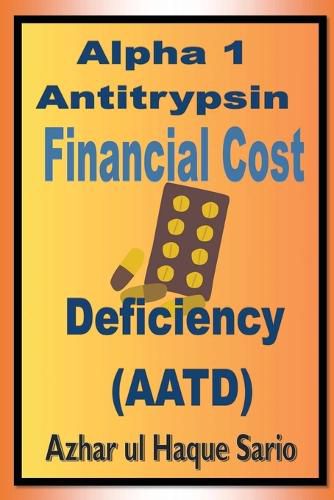Readings Newsletter
Become a Readings Member to make your shopping experience even easier.
Sign in or sign up for free!
You’re not far away from qualifying for FREE standard shipping within Australia
You’ve qualified for FREE standard shipping within Australia
The cart is loading…






This title is printed to order. This book may have been self-published. If so, we cannot guarantee the quality of the content. In the main most books will have gone through the editing process however some may not. We therefore suggest that you be aware of this before ordering this book. If in doubt check either the author or publisher’s details as we are unable to accept any returns unless they are faulty. Please contact us if you have any questions.
"Alpha-1 Antitrypsin Deficiency (AATD) Financial Cost" provides an in-depth analysis of the financial burdens associated with Alpha-1 Antitrypsin Deficiency (AATD). The book references 14 unique research studies to provide a comprehensive and evidence-based perspective on the financial costs associated with AATD. These studies cover various aspects of medical expenses, including augmentation therapy, hospitalization, emergency care, outpatient care, and the long-term financial impact on patients and families.
This research will help people by offering valuable insights into the economic challenges faced by AATD patients and their families. By understanding the financial implications, patients, healthcare providers, and policymakers can make informed decisions about treatment options, insurance coverage, and resource allocation. People care to read this research because it sheds light on the often-overlooked financial aspects of managing a chronic genetic disorder, providing a clearer picture of the true cost of care.
The book contributes to the development of healthcare strategies by highlighting the cost-effectiveness of various treatment options and identifying areas where financial support is needed. It brings innovative ideas and research by examining emerging treatments, such as gene therapy and small molecule therapies, and their economic impact. Additionally, the book offers strategies for reducing healthcare costs and improving the overall quality of life for AATD patients. This comprehensive approach makes it a valuable resource for anyone interested in the financial aspects of healthcare and the management of Alpha-1 Antitrypsin Deficiency.
$9.00 standard shipping within Australia
FREE standard shipping within Australia for orders over $100.00
Express & International shipping calculated at checkout
This title is printed to order. This book may have been self-published. If so, we cannot guarantee the quality of the content. In the main most books will have gone through the editing process however some may not. We therefore suggest that you be aware of this before ordering this book. If in doubt check either the author or publisher’s details as we are unable to accept any returns unless they are faulty. Please contact us if you have any questions.
"Alpha-1 Antitrypsin Deficiency (AATD) Financial Cost" provides an in-depth analysis of the financial burdens associated with Alpha-1 Antitrypsin Deficiency (AATD). The book references 14 unique research studies to provide a comprehensive and evidence-based perspective on the financial costs associated with AATD. These studies cover various aspects of medical expenses, including augmentation therapy, hospitalization, emergency care, outpatient care, and the long-term financial impact on patients and families.
This research will help people by offering valuable insights into the economic challenges faced by AATD patients and their families. By understanding the financial implications, patients, healthcare providers, and policymakers can make informed decisions about treatment options, insurance coverage, and resource allocation. People care to read this research because it sheds light on the often-overlooked financial aspects of managing a chronic genetic disorder, providing a clearer picture of the true cost of care.
The book contributes to the development of healthcare strategies by highlighting the cost-effectiveness of various treatment options and identifying areas where financial support is needed. It brings innovative ideas and research by examining emerging treatments, such as gene therapy and small molecule therapies, and their economic impact. Additionally, the book offers strategies for reducing healthcare costs and improving the overall quality of life for AATD patients. This comprehensive approach makes it a valuable resource for anyone interested in the financial aspects of healthcare and the management of Alpha-1 Antitrypsin Deficiency.